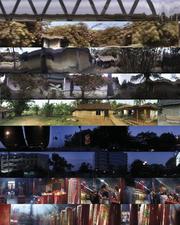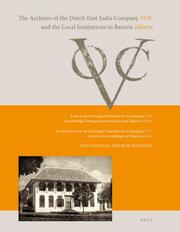| Listing 1 - 6 of 6 |
Sort by
|
Book
ISBN: 9004253440 9789004253445 9789067183116 9067183113 Year: 2011 Volume: 255 Publisher: Leiden KITLV Press
Abstract | Keywords | Export | Availability | Bookmark
 Loading...
Loading...Choose an application
- Reference Manager
- EndNote
- RefWorks (Direct export to RefWorks)
In the 1980's, sensational stories about an 'emerging new middle class' popped up simultaneously in the streets of Jakarta and at conferences of hopeful Indonesia watchers. Businesspeople and professionals had profited from President Suharto's rapid economic success, and were allegedly eager to not only to show off their new wealth, but to boost democratization processes as well. They and their families were the vanguard of a category of Jakartans who regarded themselves boldly as the ‘normal, modern, educated middle class’ of Indonesia—against the background of a profound and state-induced depoliticization. Apart from fostering a new consumer culture, the new middle class was at the root of the expansion of the conurbation Jabotabek, housing hundreds of thousands of newly arrived middle-class members. Meanwhile, a new and huge gap between rich and poor became conspicuously visible in Jakarta. During the 1990's, the increasing political instability of the New Order government and the Asian monetary crisis led to the dramatic resignation of President Suharto in May 1998. In this study, based on extensive anthropological fieldwork throughout the 1990's, this new middle class is examined as a socio-cultural phenomenon. Despite a global orientation and a taste for democracy, its members seemed to have internalized the New Order along with some lingering late-colonial notions as their guidelines for life. How ‘new’ was the new middle class anyway? Lifestyle and material culture practices in the suburb of Bintaro Raya—in public space as well as in the intimacy of living rooms—illustrate the everyday ambiguity of people who appear to be trapped in their imagined middle-classness: they were ‘lost in mall’.
Middle class --- Bourgeoisie --- Commons (Social order) --- Middle classes --- Social classes --- Social conditions --- Jakarta (Indonesia) --- Djakarta (Indonesia) --- Batavia (Indonesia) --- Betawi (Indonesia) --- Yajiada (Indonesia) --- Jakarta Raya (Indonesia) --- Economic conditions
Book
ISBN: 9789004356702 9789004355392 9004355391 9004356703 Year: 2018 Publisher: Leiden ; Boston : Brill
Abstract | Keywords | Export | Availability | Bookmark
 Loading...
Loading...Choose an application
- Reference Manager
- EndNote
- RefWorks (Direct export to RefWorks)
In The Chinese Annals of Batavia, the Kai Ba Lidai Shiji and Other Stories (1610-1795) Leonard Blussé and Nie Dening open up a veritable treasure trove of Chinese archival sources about the autonomous history of Chinese Batavia. The main part of this study is devoted to the annotated translation of a unique historical study of the Chinese community of Batavia (Jakarta) written by an anonymous Chinese author at the end of the 18th century, the Kai Ba Lidai Shiji . This historical document and a selection of other Chinese contemporary sources throw new light on a tragic event in the history of Southeast Asia's overseas Chinese: the massacre of Batavia's Chinese community in 1740.
Chinese --- Massacres --- History --- 1700-1799 --- Jakarta (Indonesia) --- Indonesia --- Ethnology --- Atrocities --- Persecution --- Djakarta (Indonesia) --- Batavia (Indonesia) --- Betawi (Indonesia) --- Yajiada (Indonesia) --- Jakarta Raya (Indonesia) --- Chinese. --- Massacres. --- 1700-1799.
Book
ISBN: 9068090127 Year: 1985 Publisher: Amsterdam Koninklijk Nederlands aardrijkskundig genootschap
Abstract | Keywords | Export | Availability | Bookmark
 Loading...
Loading...Choose an application
- Reference Manager
- EndNote
- RefWorks (Direct export to RefWorks)
Rural-urban migration --- Urbanization --- Cities and towns, Movement to --- Urban development --- Urban systems --- Cities and towns --- Social history --- Sociology, Rural --- Sociology, Urban --- Urban policy --- Country-city migration --- Migration, Rural-urban --- Rural exodus --- Migration, Internal --- Rural-urban relations --- Jakarta (Indonesia) --- Djakarta (Indonesia) --- Batavia (Indonesia) --- Betawi (Indonesia) --- Yajiada (Indonesia) --- Jakarta Raya (Indonesia) --- Economic conditions. --- Population. --- Social geography --- Indonesia

ISBN: 907808801X 9789078088011 Year: 2007 Publisher: Amsterdam : Valiz, Pub.,
Abstract | Keywords | Export | Availability | Bookmark
 Loading...
Loading...Choose an application
- Reference Manager
- EndNote
- RefWorks (Direct export to RefWorks)
Cities and towns in art --- Street photography --- Urbanization --- 711.4 --- Indonesië --- Jakarta --- Michiels, Stani --- van Helmond, Arjan --- Cities and towns, Movement to --- Urban development --- Urban systems --- Cities and towns --- Social history --- Sociology, Rural --- Sociology, Urban --- Urban policy --- Rural-urban migration --- Cityscape photography --- Outdoor photography --- Villages in art --- Stedenbouw --- Helmond, Arjan van, --- Michiels, Stani, --- Van Helmond, Arjan, --- Jakarta (Indonesia) --- Djakarta (Indonesia) --- Batavia (Indonesia) --- Betawi (Indonesia) --- Yajiada (Indonesia) --- Jakarta Raya (Indonesia) --- Architecture --- architectuurtheorie --- architectuur --- Cities and towns in art. --- van Helmond, Arjan,
Book
ISBN: 1782382690 9781782382690 9781782382683 1782382682 Year: 2014 Publisher: New York, [New York] ; Oxford, [England] : Berghahn Books,
Abstract | Keywords | Export | Availability | Bookmark
 Loading...
Loading...Choose an application
- Reference Manager
- EndNote
- RefWorks (Direct export to RefWorks)
Contributing to identity formation in ethnically and religiously diverse postcolonial societies, this book examines the role played by creole identity in Indonesia, and in particular its capital, Jakarta. While, on the one hand, it facilitates transethnic integration and promotes a specifically postcolonial sense of common nationhood due to its heterogeneous origins, creole groups of people are often perceived ambivalently in the wake of colonialism and its demise, on the other. In this book, Jacqueline Knörr analyzes the social, historical, and political contexts of creoleness both at the
Ethnicity --- Creoles --- Postcolonialism --- Ethnic conflict --- Conflict, Ethnic --- Ethnic violence --- Inter-ethnic conflict --- Interethnic conflict --- Ethnic relations --- Social conflict --- Post-colonialism --- Postcolonial theory --- Political science --- Decolonization --- Racially mixed people --- Ethnic identity --- Group identity --- Cultural fusion --- Multiculturalism --- Cultural pluralism --- Ethnic identity. --- Social conditions. --- Jakarta (Indonesia) --- Djakarta (Indonesia) --- Batavia (Indonesia) --- Betawi (Indonesia) --- Yajiada (Indonesia) --- Jakarta Raya (Indonesia) --- Ethnic relations. --- Politics and government. --- Ethnicité --- Créoles --- Postcolonialisme --- Conflits ethniques --- Social conditions --- Identité ethnique --- Conditions sociales --- Djakarta (Indonésie) --- Politics and government --- Relations interethniques --- Administration --- Ethnicity-Indonesia-Jakarta. --- Creoles-Indonesia-Jakarta-Ethnic identity. --- Creoles-Indonesia-Jakarta-Social conditions. --- Postcolonialism-Indonesia-Jakarta. --- Ethnic conflict-Indonesia-Jakarta. --- Jakarta (Indonesia)-Ethnic relations. --- Jakarta (Indonesia)-Social conditions. --- Jakarta (Indonesia)-Politics and government.

ISBN: 9004163654 9786612601422 9047421795 1282601423 9789047421795 9789004163652 9781282601420 6612601426 Year: 2007 Publisher: Leiden ; Boston : Brill,
Abstract | Keywords | Export | Availability | Bookmark
 Loading...
Loading...Choose an application
- Reference Manager
- EndNote
- RefWorks (Direct export to RefWorks)
The VOC (Verenigde Oostindische Compagnie, the Dutch East India Company) was the largest of the early modern European trading companies operating in Asia. Its operations produced not only warehouses packed with spices, coffee, tea, textiles, porcelain and silk, but also shiploads of documents. Data on political, economic, cultural, religious, and social conditions spread over an enormous area circulated between the VOC establishments, the administrative centre of the trade in Batavia, now the city of Jakarta, and the Board of Directors in the Netherlands. The co-operation between the National Archives of Indonesia and the Netherlands resulted in this extensive catalogue of fifteen archives of VOC institutions in Jakarta. The VOC records are included in UNESCO´s Memory of the World Register.
Arsip Nasional Republik Indonesia -- Catalogs. --- Dutch -- Asia -- History -- Sources -- Bibliography -- Catalogs. --- Jakarta (Indonesia) -- History -- Sources -- Bibliography -- Catalogs. --- Nederlandsche Oost-Indische Compagnie -- Archives -- Catalogs. --- Netherlands. Algemeen Rijksarchief -- Catalogs. --- East Asia --- Regions & Countries - Asia & the Middle East --- History & Archaeology --- Nederlandsche Oost-Indische Compagnie --- Archives --- Jakarta (Indonesia) --- History --- Sources --- Compagnie néerlandaise des Indes orientales --- Oost-Indische Compagnie (Netherlands) --- Dutch East India Company --- Vereenigde Oost-Indische Compagnie (Netherlands) --- Oostindische Vereenigde Maatschappij (Netherlands) --- East India Company (Netherlands) --- Oranda Tō-Indo Kaisha --- Tō-Indo Kaisha (Netherlands) --- Societas Privilegiata Foederati Belgii ad Navigationem & Commercia Indiarum Orientalium --- Jan Compagnie (Netherlands) --- Oranda Higashi Indo Kaisha --- Higashi Indo Kaisha (Netherlands) --- V.O.C. --- VOC --- Verenigde Nederlandsche Geoctroyeerde Oost-Indische Compagnie --- Verenigde Oostindische Compagnie (Netherlands) --- Nederlandse Oost-Indische Compagnie --- East India Company of the United Provinces --- Oostindische Compagnie (Netherlands) --- Generaale Nederlandsche Oost-Indische Compagnie --- United Dutch East India Company --- Nederlandsche Oost-Indische Maatschappij --- Compagnie hollandoise des Indes orientales --- Compagnie des Indes orientales hollandaises --- Niederländische Ostindische Kompanie --- Vest-Indskai︠a︡ kompanii︠a︡ (Netherlands) --- Gollandskai︠a︡ torgovai︠a︡ kompanii︠a︡ (Netherlands) --- Compagnia olandese delle Indie orientali --- Compagnia riunita (Netherlands) --- Compagnia riunita delle Indie orientali (Netherlands) --- Verenigde Oostindische Compagnie --- Compagnie hollandaise des Indes orientales --- O.I. Comp. (Oost-Indische Compagnie) --- Djakarta (Indonesia) --- Batavia (Indonesia) --- Betawi (Indonesia) --- Yajiada (Indonesia) --- Jakarta Raya (Indonesia) --- Instituties. --- Vereenigde Oost-Indische Compagnie. --- Jakarta (stad)
| Listing 1 - 6 of 6 |
Sort by
|

 Search
Search Feedback
Feedback About
About Help
Help News
News